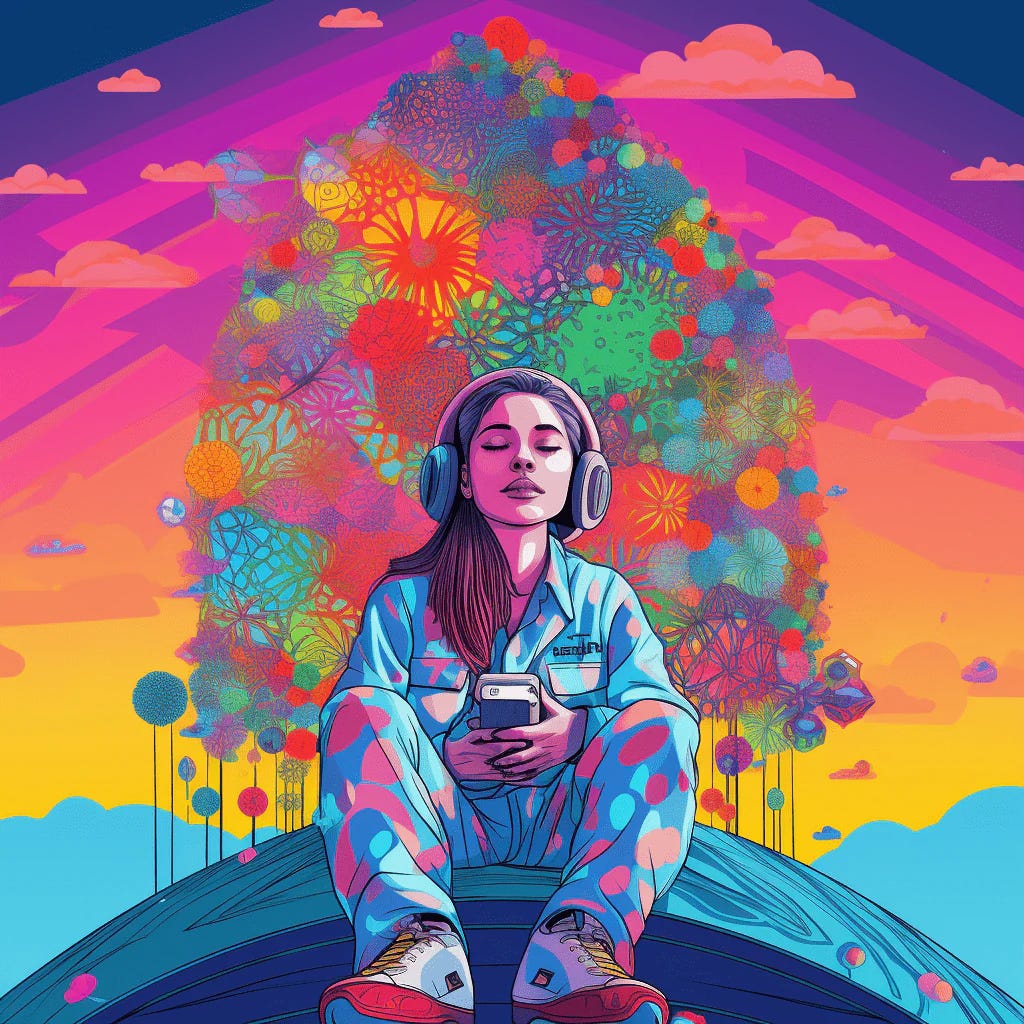Q: How to choose a psychedelic for therapy: ketamine, psilocybin, or MDMA?
The pros and cons of the three most common psychedelics used in therapeutic settings - the safest and most supportive for where you are right now.
Each Friday, I unpack questions from women exploring psychedelics+. I’m not a doctor or scientist—I’m sharing what I’ve learned from a decade supporting women’s unorthodox choices to improve their well-being.
Finally, a name for this weekly column. Read to the end to learn more. ✌️
Q: How do I choose between ketamine, psilocybin, or MDMA?
This question came via email from a woman in her early 50s looking to address fear.
In my experience, the number of people turning to psychedelics to address fear is only second to those who are making this choice to help them navigate grief. Confronting fear isn’t always the objective before identifying medicine as a next step, but often, at the core of avoidance, anger, and anxiety is fear.
For women in midlife(me!), fear is suddenly everywhere(me!). Whether it’s the fear of being alone, aging parents, changing identities, or an empty nest, it seems to hit differently after 50(not quite me!). Science backs this up: midlife women are more likely to report anxiety-related symptoms than men the same age, often tied directly to these hormonal changes. These fluctuations during perimenopause and menopause—especially shifts in estrogen and progesterone—can increase emotional sensitivity and make it harder to regulate stress.
If you’re a woman over 40 who is increasingly more aware of your fear, check with your doctor about how hormones may be impacting your mental and emotional state. If you’ve done that and you are clear that engaging with psychedelic medicine is the next course of action, let’s walk through the three most common used in therapeutic settings—ketamine, psilocybin, and MDMA—so you can choose what’s safest and most supportive for where you are right now.
If fear feels more like constant tension, paralysis, or anxiety, you may find yourself thinking or saying: “I’m just frozen,” or “I feel like I’ve lost access to myself.”
Ketamine can offer immediate relief if fear is physiological—chronic anxiety, panic, or emotional shutdown.
It creates mental distance and stillness, especially useful if fear has become part of your default state.
You may not “feel” much emotionally, and that’s okay—it’s more about getting unstuck so you can move forward.
What it feels like:
Ketamine creates distance between you and your everyday thoughts. For many, it brings relief from looping patterns like depression or chronic anxiety. You may feel detached from your body or emotions—which isn’t a bad thing. Sometimes a break from your emotional noise is exactly what’s needed to reset your perspective.
Why it’s used in therapy:
Fast-acting, especially for treatment-resistant depression
Doesn’t require emotional processing to be effective
Typically done in a clinic or with a licensed provider (legally available in the U.S.)
Best fit for:
Depression, burnout, emotional exhaustion
Those needing symptom relief to even begin deeper work
Women who tend to overfunction and feel emotionally overloaded
Things to know:
Often paired with talk therapy (called KAP – Ketamine-Assisted Psychotherapy)
Sessions last 45–90 minutes
You’ll need to avoid alcohol, benzos, and certain medications beforehand
Not ideal if you have uncontrolled high blood pressure, heart issues, or a history of psychosis
Support tip:
Plan for at least 2 hours of downtime afterward. It’s a short trip, but integration still matters.
Prepare with The Comprehensive Ketamine Guide from SetSet, a clinician-created PDF and audio guide that maps candidate criteria, dosing, and more.
Listen to this:
If the fear is existential or spiritual, you may find yourself thinking or saying, “I don’t know who I am anymore,” or “I feel disconnected—from myself, others, or spirit.”
Psilocybin can support women who are afraid of what comes next—whether that’s aging, identity shifts, or loss of meaning.
It invites a reconnection with intuition, sensuality, and your place in the bigger picture.
It often brings up emotion, so it's helpful if you want to feel and move through what’s been avoided.
What it feels like:
Psilocybin brings emotion to the surface—grief, joy, regret, awe—and often connects you to nature, your body, and memories you’ve boxed up. You may laugh. You may cry(me!). But you won’t be numb. If you’ve spent years managing instead of feeling, this medicine tends to meet you right there.
Why it’s used in therapy:
Encourages emotional breakthroughs
Increases cognitive flexibility (which helps break rigid patterns)
Supports spiritual insight and identity shifts
Common in retreat or underground settings due to legal restrictions
Best fit for:
Grief, life transitions, spiritual disconnection
Women in midlife navigating loss, menopause, or reinvention
Anyone ready to explore the “why” beneath the symptoms
Things to know:
Lasts 4–6 hours
Can interact with antidepressants and mood stabilizers
Avoid if you have a history of psychosis, schizophrenia, or bipolar disorder
Support tip:
Prepare with The Ultimate Psilocybin Guide from SetSet, a clinician-created PDF and audio guide to make a fully informed decision.
Listen to this:
Music can shape the entire journey, so SetSet’s created exclusive electronic soundscapes for a mushroom journey here. Also on YouTube.
If the fear is rooted in trauma, rejection, or emotional vulnerability, you may find yourself thinking or saying: “I know I need to look at this, but I can’t face it alone,” or
“I’m scared of what I’ll feel if I go there.
MDMA is often the best fit when the fear comes from past hurt—emotional betrayal, relationship trauma, or abandonment.
It helps create a profound sense of safety and self-compassion, which allows you to explore your story without becoming overwhelmed.
Especially powerful if you've done years of talk therapy and still feel stuck.
What it feels like:
MDMA reduces fear and boosts feelings of love, trust, and connection. It’s not about visuals or deep introspection. Instead, it creates a sense of safety in your nervous system, so you can revisit challenging experiences without shutting down. This is why it’s so powerful for trauma.
Why it’s used in therapy:
Increases access to difficult memories with less emotional overwhelm
Enhances trust and emotional clarity
Often used in clinical trials for PTSD
Still illegal outside clinical trials in the U.S., but may be legalized soon for therapy
Best fit for:
PTSD, relational trauma, or fear-based patterns
Anyone needing to feel safe to go deeper
Women healing from betrayal, abandonment, or abuse
Things to know:
Sessions can last 6–8 hours
Requires several days of recovery and integration afterward
Not compatible with most antidepressants (especially SSRIs)
Support tip:
You’ll want a therapist or guide who is trauma-informed. Integration is non-negotiable after MDMA. Plan space for it with SetSet’s Universal Integration, a DIY program created by a clinician rooted in the Neurobiology of Change.
Listen to this:
How to Choose a Psychedelic for Therapy
This isn’t a decision you have to rush—or make perfectly. The best starting point is asking yourself a few honest questions:
What do I need most right now? (Relief, clarity, connection, safety?)
Which symptoms or patterns am I living with daily?
What kind of support do I have in place—emotionally and medically?
Am I more afraid of feeling too much or not feeling at all?
Each psychedelic offers something different:
Ketamine gives perspective
Psilocybin offers depth
MDMA provides emotional safety
And while these medicines can be powerful, they’re not quick fixes. They work best with integration, intention, and care—before, during, and after the journey.
If You're Still Unsure
Totally normal. Here are a few low-stakes first steps:
Talk to a trauma-informed therapist or integrative doctor
Start journaling your intentions—what do you hope to shift or heal?
Learn from others' experiences
Try non-psychedelic practices like breathwork or somatic therapy to prepare
And remember: You don’t have to choose alone. A trauma-informed therapist or psychedelic guide can help assess what’s safe and most aligned. Send me a message for a trusted referral or to submit a question- hi@getsetset.com.
Take care,
April
Are you looking to cut back on alcohol or cannabis? Maybe you’re stuck--in your job, relationship, on a loop in your mind? Me, too! This is why I sought out a clinician to create DIY mushroom and microdosing guides. And now these accessible downloads are bundled with my favorite mushroom chocolate.
Get started to get SetSet!













